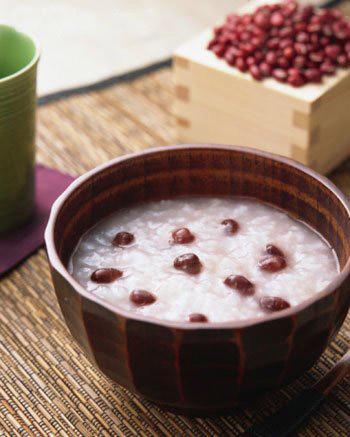Laba Festival: Laba Rice Porridge
2010-02-09 16:11 BJT
The majority Han Chinese have long followed the tradition of eating Laba rice porridge on the eighth day of the twelfth lunar month. The date usually falls in mid-January and is a traditional Chinese festival, called Laba Festival.
 |
| Laba Rice Porridge |
Laba rice porridge contains glutinous rice, red beans, millet, Chinese sorghum, peas, dried lotus seeds, red beans and some other ingredients, such as dried dates, chestnut meat, walnut meat, almond, peanut, etc.
Actually eight ingredients are used, cooked with sugar to make the porridge tasty. Northerners prefer to use glutinous rice, red beans, dates, lotus seeds, dried long'an pulp, walnuts, pine nuts and other dried fruits in their porridge; southerners like a salty porridge prepared with rice, soybeans, peanuts, broad beans, taro, water chestnuts, walnuts, vegetables and diced meat. In the north, it is a dessert with sugar added; in the south, salt is put in. Some people like to add cinnamon and other condiments to add flavor.
Controlling the heat is of great importance in making Laba porridge. At the start, the flame must be high, but the fire is then turned down to let the porridge simmer until it begins to emit a very delicious smell. The process is time-consuming but not complicated.
Laba porridge is not only easy to prepare, but also a nutritious winter food because it contains amino acids, protein, vitamins and other nutrition people need. Cooked nuts and dried fruit are good for soothing nerves, nourishing one's heart and vitality, and strengthening the spleen. Perhaps that is why it is also called babao (Eight Treasure) porridge.
Origin
Laba is celebrated on the eighth day of the last lunar month, referring to the traditional start of celebrations for the Chinese New Year. La in Chinese means the 12th lunar month and ba means eight.
Legends about the origin of this festivity abound. One holds that over 3,000 years ago sacrificial rites called La (臘) were held in the twelfth lunar month when people offered up their preys to the gods of heaven and earth. The Chinese characters for prey (獵) and the twelfth month (臘 La) were interchangeable then, and ever since La has been used to refer to both. Since the festival was held on the eighth day of the Last month, people later appended the number eight (ba in Chinese), giving us the current Laba.

 Mail
Mail Share
Share Print
Print


 Video
Video









 2009 China Central Television. All Rights Reserved
2009 China Central Television. All Rights Reserved